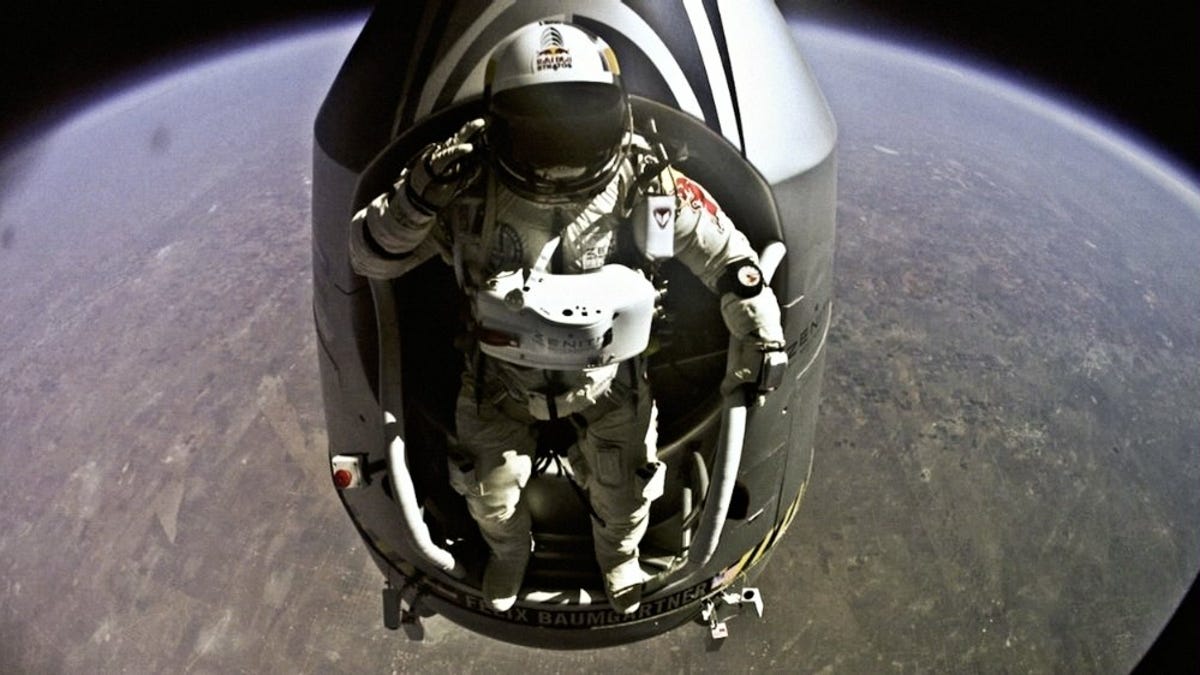Baumgartner's supersonic freefall: Faster than you thought
Red Bull Stratos releases the final data from Felix Baumgartner's breathtaking skydive last October. Seems he got to Mach 1.25, not the woeful Mach 1.24 of the previous estimate.

The wheels of bureaucracy do not turn at a supersonic rate.
It's been nearly four months since Felix Baumgartner traveled many, many miles into the sky in order to come hurtling back down to Earth in a freefall faster than the speed of sound. Judging by the data released by his backers at Red Bull Stratos, his jump was a breathtaking success. It was certainly thrilling to watch.
But it's not yet a world record (or as Baumgartner's group expects, several world records). For that, we're all still waiting for validation of the data by the Federation Aeronautique Internationale, the nonprofit, nongovernmental organization that regulates air sporting events and certifies record claims for aviation and aerospace achievements.
The certification for Baumgartner's jump from his balloon-slung capsule may now be a little closer. Red Bull Stratos this morning released what it says is the final data from the October 14 freefall.
The numbers didn't change a whole heck of a lot from the preliminary findings. Red Bull Stratos now says the maximum vertical speed was 843.6 mph, or Mach 1.25, ever so slightly faster than the earlier reported 833.9 mph, or Mach 1.24. The jump altitude, meanwhile, wasn't quite so high as earlier thought -- it now stands at 127,852.4 feet, down less than the length of a football field from the previous estimate of 128,100 feet. Either way, it still rounds out to a dizzying 24 miles up.
The distance of the vertical freefall portion (just over 4 minutes) of the overall descent (just over 9 minutes) was shortened a tad to 119,431.1 feet. The earlier estimate had been 119,846 feet.
And in case you were wondering what it feels like to go supersonic, here are some vital stats and other data tidbits from the October skydive by the 43-year-old Baumgartner:
- His heartbeat reached a maximum of 185 beats per minute (bpm) when he exited the capsule and ranged from 155 to 175 bpm during freefall -- 169 bpm when he hit Mach 1.25. (I think my heartbeat was higher just watching the you-are-there video stream. My palms were surely sweatier.) That compares with Baumgartner's heartbeat of 40 to 100 bmp during the "prelaunch oxygen prebreathe."
- His respiratory rate hit a maximum of 30 to 43 breaths per minute during the freefall.
- He experienced 25.2 seconds of absolute weightlessness during the initial stage of his freefall.
- He was in a "flat spin" for about 13 seconds during a stretch of turning and spinning that reached a maximum rate of 60 revolutions per minute.
- The G meter on Baumgartner's wrist never experienced the 6 continuous seconds at 3.5 G that would have triggered deployment of his stabilization parachute. His cranial region, "the area of most concern," remained under 2 G for the duration of his spin.
This is one cool character under pressure -- you'd have to be, really, after more than 2,000 skydives, including jumping off the tallest buildings in the world, or into the occasional deep, dark cave. Here's how he described the supersonic freefall, in this morning's Red Bull Stratos statement:
It feels like you are floating into space, and then you pick up speed very fast -- but you don't feel the air because the air density is so low. For almost 35 seconds I couldn't sense the air around me because basically there was none. That kind of helpless feeling is annoying as a professional skydiver. And then when you finally enter a thicker air layer you have to keep yourself completely symmetrical because otherwise you start spinning, which is what happened to me.
So when can Fearless Felix expect the official word on whether, as expected, he set his world records? I put that question this morning to the Switzerland-based FAI (which does have the preliminary data on record), and got back only the most bureaucratic of responses: "Sorry, we didn't received [sic] the dossier at this date."

